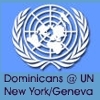

| BRIEFING - May 16, 2012 | To learn more about the Millenium Development Goals, click on the graphic Past Briefings: April 18, 2012 April 4, 2012 March 7, 2012 February 22, 2012 February 8, 2012 January 25, 2012 January 11, 2012 December 21, 2011 December 7, 2011 November 9, 2011 October 19, 2011 October 5, 2011 |
|
‘35 days to the future we want’: RIO+20 is June 20–22
The paradigm shift from unsustainable economic growth models of consumption and production, to a more sustainable development model providing for the needs of people while respecting Earth’s limited resource base, was a commitment at the highest political level in 1992. However, 20 years later, the world is in a far more precarious position, with more and more people living in abject poverty and the health of the planet severely compromised, even as the major transnational corporations enjoy record-breaking profits. One of the major themes of the conference will be the green economy. However, there is a consensus among civil society sectors that this is simply an attempt to make the current market-driven system more environmentally palatable. In this period of financial crisis, global capitalism seeks new forms of accumulation. Today, it is the global commons which have become the prime target of the market. As such, the green economy becomes nothing more than a “green” mask for unbridled capitalism, and provides a new mechanism to appropriate and commodify our forests, rivers, land, natural resources—all for the sake of profit. The idea is to replace the extraction of petroleum with the exploitation of biomass: that is, non-fossilized biological material, such as plants, animals, rivers, land, resources, forests, algae, etc. The vision is of a post-petroleum future where industrial production depends not on fossil fuels, but on biological feedstocks transformed through high technology bioengineering. The greatest storehouses of this biomass, both land and aquatic, are located in the global South, where peasant farmers, fisher-people, and the Indigenous Peoples of the area have tended to Earth and her resources since time immemorial. Investment capital now seeks new markets through this “green economy,” securing the world’s natural resources as primary inputs and commodities for industrial production. It is not by coincidence that among the biggest backers of the green economy are major corporations in the areas of energy (Exxon, BP, Chevron, Shell); pharmaceuticals (Roche, Merck); food and agriculture (Unilever, Cargill, DuPont, Monsanto, Procter & Gamble); chemicals (Dow, DuPont, BASF). Another major concern for civil society is the growing influence of major corporations and the business lobby groups within the UN system itself, and their influence on the positions of national governments in multilateral negotiations. Corporate lobbying has managed to block effective solutions for problems related to climate change, food production, the violation of human rights, water supply, health issues, poverty eradication. The role of civil society here at the UN in New York, as well as at the upcoming conference in Rio, will be to persistently challenge the UN and its member states to resist this deadly corporate over-reach, which undermines multilateralism to the great detriment of both Earth and her Peoples. A parallel process to RIO + 20 is the Peoples’ Summit, which is being organized by civil society. Among the topics this summit will consider are the global commons; civil society organizations and social movements; the right to water as a common good; territories and native peoples; sustainable cities—all from an ethical framework. In conclusion, I would like to introduce you to a wonderful web site: Faith, Economy, Ecology and Transformation This is a loose coalition of mostly faith-based organizations and individuals who believe that humanity is being called to radically change its interactions with each other and with Earth. It espouses a shift from an ethic of exploitation to an ethic of right relationship. This will require a change of focus from material goods to holistic well-being; from excess to sufficiency; from exclusion to inclusion; from competition to cooperation; from the pursuit of privilege, to the pursuit of the common good; and from the pre-eminence of the human, to a reverence for life in all its forms. “The natural world is the larger sacred community to which we belong. To be alienated from this community, is to become destitute in all that makes us human.” —Thomas Berry
|
Dominican Leadership Conference
Building relationships and collaborating in the mission of preaching the Gospel
29000 West Eleven Mile Road
Farmington Hills MI 48336
248-536-3234 Contact: Executive Director

